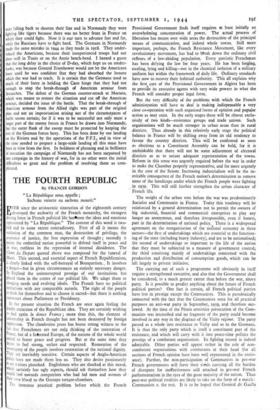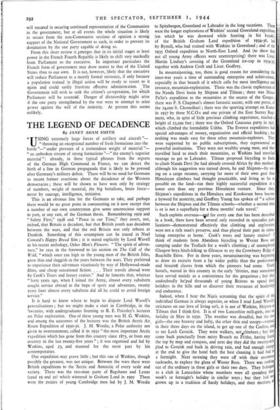THE FOURTH REPUBLIC
By FRANCIS GORDON " La Republique nous appelie ; Sachons vaincre ou sachons mourir."
LIVER since the aristocratic sinecurists of the eighteenth century J destroyed the authority of the French monarchy, the strongest driving force in French political life has/been the ideas and emotions represented by " La Republique." The content of this word is two- fold and to some extent contradictory. First of all it means the exaltation of the common man, the destruction of privilege, the assurance of justice, the free expression of thought ; secondly it means the embattled nation powerful to defend itself in peace and in war, ruthless in the repression of internal dissidence. The Chant du Depart quoted above was composed for the funeral of Nlarat. This second, and essential aspect of French Republicanism, is clearly linked with the self-betrayal of Bonapartism.. It involves a danger—but in given circumstances an entirely necessary danger. In England the uninterrupted prestige of our institutions has placed them in the centre of our political life. We adapt them to changing needs and evolving ideals. The French have no political institutions with any comparable aureole. The right of the people to think for themselves and to choose is sacred—but there is nothing sacrosanct about Parliament or Presidency.
In the present situation the French are once again feeling the double attraction of the Republican idea. They are certainly wishing to find again la douce France ; more than this, the element of universality in French thought has not been destroyed by foreign oppression. The clandestine press has borne strong witness to the fact that Frenchmen are not only thinking of the restoration of France, but of a federated Europe, of the nations of the whole world united to foster peace and progress. But at the same time they desire to feel strong, secure and respected. Restoration of the sovereignty of the people involves restoration of the national dignity. They are inevitably sensitive. Certain aspects of Anglo-American Policy have not made them less so. They also desire passionately to see traitors punished. Englishmen who are shocked at this mood, Which certainly has ugly aspects,. should ask themselves how they Would feel towards compatriots who had led men and women of their own blood to the Gestapo torture-chambers.
The immense practical problem before which the French
Provisional Government finds itself requires at least initially an overwhelming concentration of power. The actual process of liberation has meant over wide areas the destruction of the principal means of communication, and indeed whole towns. Still more important, perhaps, the French Resistance Movement, like every revolutionary movement, has had to break down the ordinary civil reflexes of a law-abiding population. Every patriotic Frenchman has been defying the law for four years. He has been forging, stealing, lying and killing—not in the chemical isolation of a military uniform but within the framework of daily life. Ordinary standards have now to recover their habitual authority. This all explains why the first care of the Provisional Government in Algiers has been to provide its executive agents with very wide powers in what the French will consider proper legal form.
But the very difficulty of the problems with which the French administration will have to deal is making indispensable a very close co-operation with such organised forms of opinion and popular action as may exist. In the early stages these will be almost exclu- sively of two kinds—resistance groups and trade unions. Such organisations will be much stronger in urban areas than in rural districts. Thus already in this relatively early stage the political balance in France will be shifting away from its old tendency to favour the country districts. This, will be confirmed as soon as elections to a Constituent Assembly can be held, for it is unthinkable that there will not be some adjustment of electoral districts so as to secure adequate representation of the towns. Reform in this sense was urgently required before the war in order to make the Chamber properly representative, and far more urgently in the case of the Senate. Increasing industrialism will be the in- evitable consequence of the French nation's determination to remove some of the handicaps under which the French people were fighting in 1939. This will still further strengthen the urban character of French life.
The weight of the urban vote before the war was predominantly Socialist and Communist in France. Today this tendency will be reinforced by a general determination not to permit the owners of big industrial, financial and commercial enterprises to play any longer an anonymous, and therefore irresponsible, even if honest, part in the determination of national policy. There is a widespread agreement on the reorganisation of the national economy in three sectors—the first of undertakings which are essential to the function- ing of the state (including heavy industry), and are to be nationalised; the second of undertakings so important to the life of the nation that they must be subjected to a measure of government control; the third consisting mainly of undertakings concerned with the production and distribution of consumption goods, which can be left largely to private initiative.
The carrying out of such a programme will obviously in itself require a strengthened executive, and also that the Government shall be considered, to a much greater extent than before the war, above party. Is it possible to predict anything about the future of French political parties? One fact is certain, all French political parties have lost in prestige except the Communists. This is paradoxically connected with the fact that the Communists were for all practical purposes an anti-war party in September, 1939, and therefore out- lawed. At the time of the Main armistice persecution of the Com- munists was intensified and no fragment of the party could become involved in any way in the disgrace of the Vichy regime. The party passed as a whole into resistance to Vichy and so to the Germans. It is thus the only party which is itself a constituent part of the resistance, and which will carry with it into peace-time politics the prestige of a combatant organisation. Its fighting record is indeed admirable. Other parties will appear rather in the role of non- combatant organisations with combatants at their head (for all sections of French opinion have been well represented in the resist- ance). Further, the non-participation of Communists in pre-war French governments will leave their rivals carrying all the burden of disrepute for ineffectiveness still attached to pre-war French parliamentarism in the eyes of the great majority of the nation. Thus post-war political rivalries are likely to take on the form of a match: Communists v. the rest. It is to be hoped that General de Gaulle will succeed in securing continued representation of the Communists in the government, but at all events the whole situation is likely to secure from the non-Communist sections of opinion a strong support of the National Government as such, in order to prevent its domination by the one party capable of doing so.
From this short review it ;merges that in its initial stages at least power in the French Fourth Republic is likely to shift very markedly from Parliament to the executive. In important particulars the French form of government may draw nearer to that of the United States than to our own. It is not, however, likely that the executive will reduce Parliament to a merely formal existence, if only because a population trained in illegal action will be ready to resort to it again and could easily frustrate effective administration. The Government will wish to seek the citizen's co-operation, for which Parliament will be essential. Danger of dictatorship might arise if the one party strengthened by the war were to attempt to seize power against the will of the majority. At present this seems unlikely.



























 Previous page
Previous page